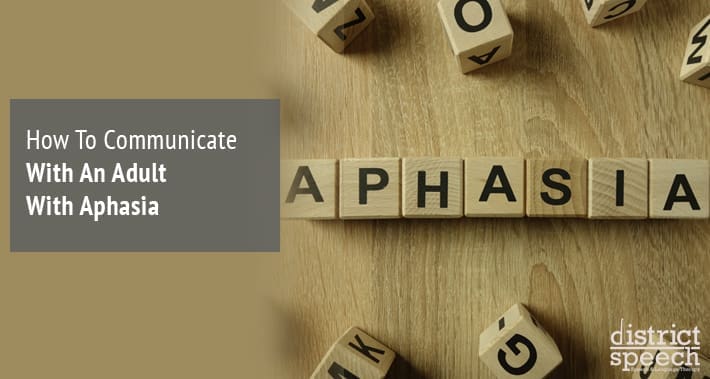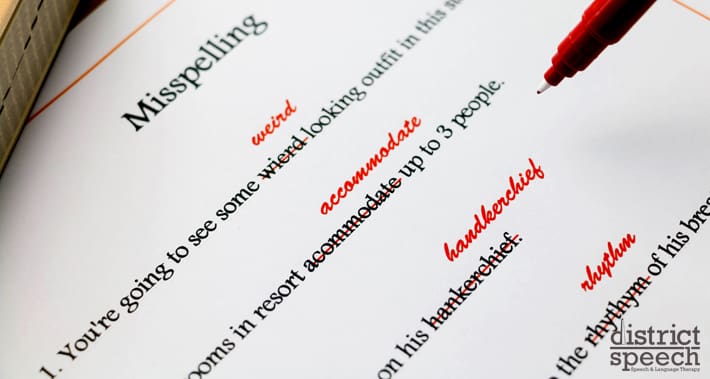
Are there times when you know what you want to say, but the words you need to convey that thought just won’t come to mind?
Or do you occasionally find full sentences hard to form?
Imagine that happening all the time.
For the approximately one million adults in the United States living with aphasia, this thought is a reality.
If you have aphasia, you might benefit from speech therapy for adults at District Speech.
If you don’t have aphasia yourself, however, you might know someone who does.
At District Speech, we know that being unable to communicate with your loved ones as well as you used to can be both frustrating and disheartening.
But what is aphasia, and how can you learn to communicate more effectively with the people around you?
Keep reading to find out.
What Is Aphasia?
Aphasia is a language disorder that interferes with your ability to understand language.
It affects a wide range of skills, including your speaking, reading, and writing skills.
Aphasia doesn’t affect intelligence; many adults with aphasia think clearly and logically and display average or above average intelligence.
This article published by Carnegie Mellon University aptly refers to aphasia as a “loss of language, not intellect”.
What Are The Causes Of Adult Aphasia?
Your brain’s left side is responsible for the majority of your language based skills.
RELATED: How Does Your Brain Control Speech?
Thus, adult aphasia commonly develops following damage to the left side of the brain.
This damage can occur for a variety of reasons, including:
- Strokes
- Head injuries, such as a traumatic brain injury
- Brain tumors
- Infections, such as meningitis
- Dementia
What Are The Symptoms Of Adult Aphasia?
Adult aphasia has many symptoms.
Most people with aphasia display some degree of challenges with speaking, writing, understanding, and reading.
The types of challenges vary according to the individual.
Speech Issues
Speech issues are one of the most common symptoms of aphasia.
This is called “expressive” speech – the part of speech where you’re the one doing the talking.
For instance, many people with aphasia have trouble thinking of the right words to say.
They might insert made up words instead.
Other aphasia symptoms surround word association and sounds.
For instance, you might accidentally say a word that is related to a word that you want to say, such as “tree” instead of “flower.”
Or you might say a word that doesn’t make sense in the given context, such as “theater” instead of “tennis.”
If you have aphasia, you might also switch sounds in words, for example, saying “dumble tryer” instead of “tumble drier.”
Sentences might also be challenging, with single words being easier to say.
A speech therapist at District Speech can help adults living with aphasia navigate these issues.

Reading And Writing Issues
Aphasia might also affect your reading and writing ability.
If you have aphasia, you might struggle to read text on forms, books, and computer screens.
You might also have trouble spelling and writing full sentences.
Some people with aphasia have trouble with numbers and math, which can make telling the time, counting money, and doing addition and subtraction more difficult.
Speech and language therapy for reading impairments can help.
Understanding Issues
If you have aphasia, you might struggle to understand what others say, especially when they are speaking quickly or if they use longer sentences.
This is called “receptive” speech – the part of speech where you’re receiving information, rather than expressing it.
A noisy background or a group setting might also complicate your understanding.
Sometimes, you might not understand or recognize a joke.
Speak to District Speech today to find out how speech therapy for aphasia can help alleviate some of these issues.
How Is Adult Aphasia Different From Aphasia In Children?
The main difference between adult aphasia and childhood aphasia is that aphasia in children is usually congenital.
According to Johns Hopkins Medicine, adults tend to develop aphasia due to some type of brain injury or stroke.
This is why speech therapy exercises for stroke recovery often revolve around addressing aphasia.
RELATED: How To Recognize When Somebody Is Having A Stroke
Whether you acquired aphasia as an adult or have had it since childhood, there are ways to manage it.
How To Communicate With An Adult With Aphasia
Whether you have aphasia yourself or know someone with the condition, there are steps you can take to support effective communication.
These tips are helpful even if nobody in the conversation has aphasia; effective conversation is something that anyone can strive for.
RELATED: Communication Deficits In Adults
For starters, you can make sure that the person you’re talking to knows you’re talking to them.
This is important because aphasia often makes it harder for them to understand you, or they might miss what you’re saying if they don’t realize you’re trying to talk to them.
You can also try to keep eye contact with the other person and watch their body language, while being mindful of your own body language.
Body language is often helpful in emphasizing the things you are saying and can be a powerful tool in getting your point across, which makes it easier for others to understand you.
RELATED: Frequently Asked Questions About Sign Language
Be aware of the noise levels in your conversation environment, and make sure you aren’t speaking too quickly.
If you can reduce background noise by turning off the TV or radio, that will help your conversation partner hear and understand you better.
Less background noise also means that you can talk at a normal volume, though you can raise your voice a little if your conversation partner asks.
RELATED: Why Your Voice Is Weak And What You Can Do About It
Speak clearly, with shorter sentences and simpler words, but don’t patronize your conversation partner.
Book Your Appointment With District Speech Today
If either you or someone you know has aphasia, a speech therapist at District Speech can help.
Speech therapists are trained to work with people living with speech and language problems, such as aphasia.
The qualified staff here at District Speech can help identify the challenges you are experiencing with your aphasia and work with you to meet your communication goals.
We can also help your friends and family by teaching them how to communicate more easily, and suggest supplemental or alternative ways to communicate.
Book your appointment with District Speech today to get started on improving the symptoms of your aphasia.
1300 I St NW, Suite 400 E,
Washington, DC 20005
- https://g.page/districtspeech
District Speech and Language Therapy specializes in speech therapy, physical therapy, and occupational therapy solutions, for both children and adults, in the Washington D.C and the Arlington Virginia areas.